U.S.-Israeli strikes on Iran: What we know so far
The United States and Israel have carried out large-scale strikes on Iranian leadership and military targets, with Iranian state media confirming t...
Berlin, February 21, 2025 – German citizens will head to the polls on Sunday, February 23, for a snap general election after the coalition government collapsed late last year.
The election will determine the country's next government amid pressing concerns about the economy, migration, and Germany’s role in Ukraine’s war with Russia.
A February 12 poll by Politico showed the opposition Christian Democratic Union (CDU) and its Bavarian ally, the Christian Social Union (CSU), leading with 29% support. The right-wing Alternative für Deutschland (AfD) followed with 21%, while Chancellor Olaf Scholz’s Social Democratic Party (SPD) trailed at 16%. The Greens secured 12% in the poll.
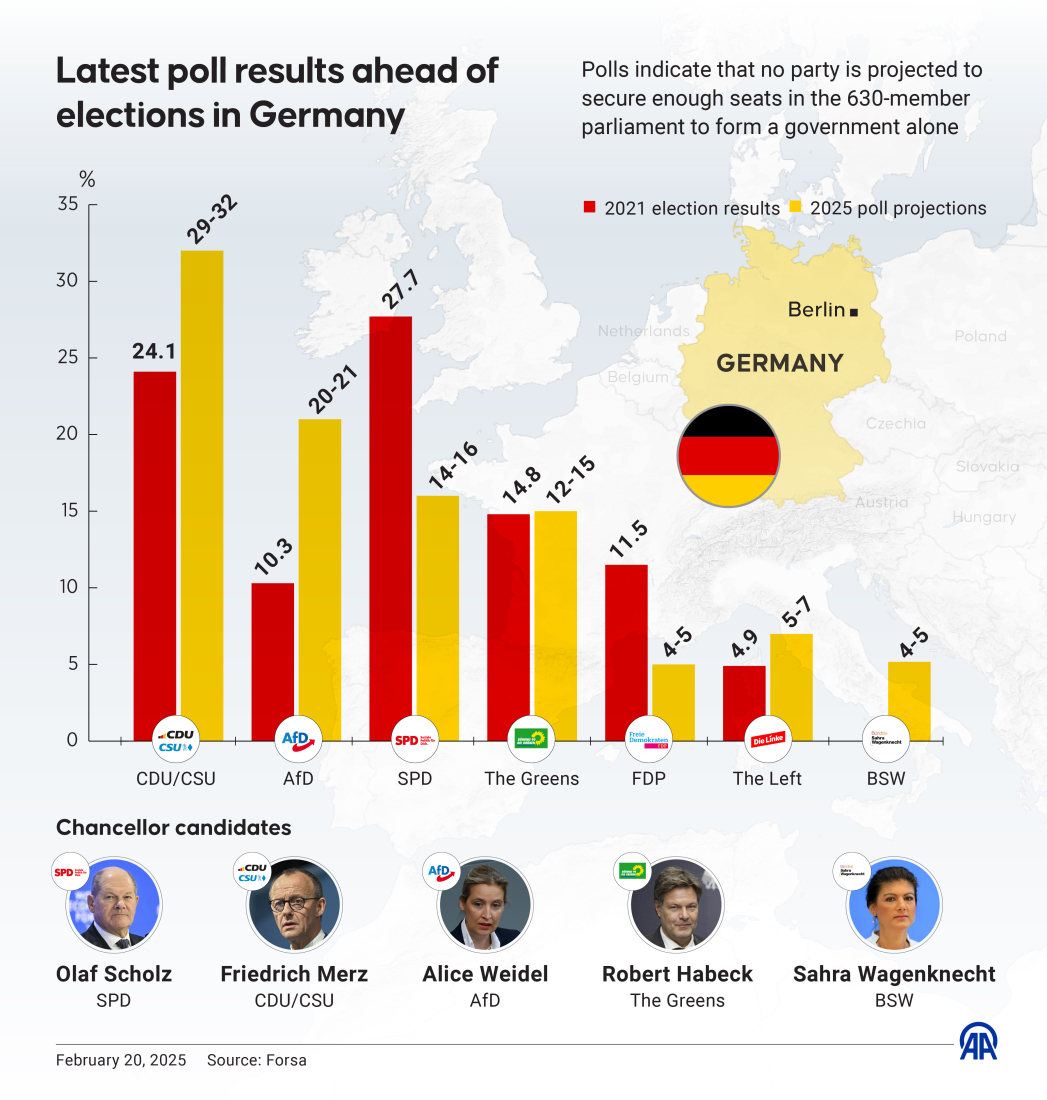
Junior Professor Endre Borbath from Ruprecht-Karls-Universität Heidelberg told Al Jazeera that the CDU’s resurgence was unsurprising. "Due to the war in Ukraine, and the resources required to support Kyiv, much of the government's priorities had to be scaled down," he said.
Why was a snap election called in Germany?
In November 2024, Germany’s ruling coalition - a three-way alliance between the SPD, Greens, and the Free Democratic Party (FDP) -collapsed due to internal disputes over the economy. Scholz subsequently dismissed Finance Minister Christian Lindner (FDP), accusing him of obstructing budget plans and prioritizing party interests over national needs. The FDP withdrew from the government, prompting a no-confidence vote in December, which Scholz lost.
Which main parties are contending?
Germany’s centrist parties - the SPD and CDU/CSU - are facing challenges from both the far right (AfD) and smaller left-wing parties such as the Greens and the newly formed Sahra Wagenknecht Alliance (BSW). The neoliberal FDP and the far-left Linke are also competing.
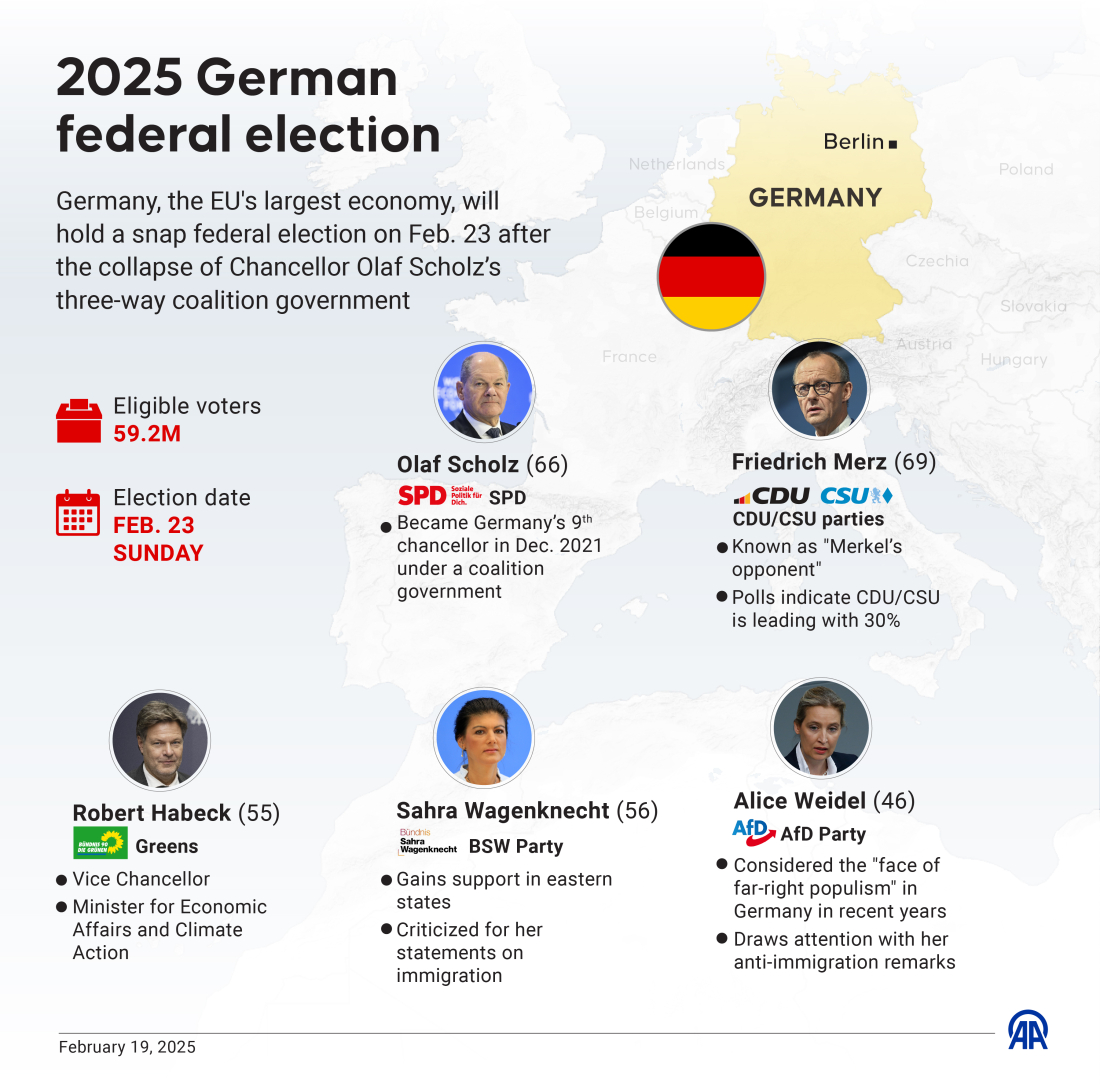
Who are the two main candidates and what are their policies?
Olaf Scholz (SPD)
Scholz, 66, has led Germany since 2021, navigating domestic and European crises, including Russia’s invasion of Ukraine. However, economic struggles and internal coalition disputes have weakened his approval ratings, which stood at 31% in January, according to Statista.
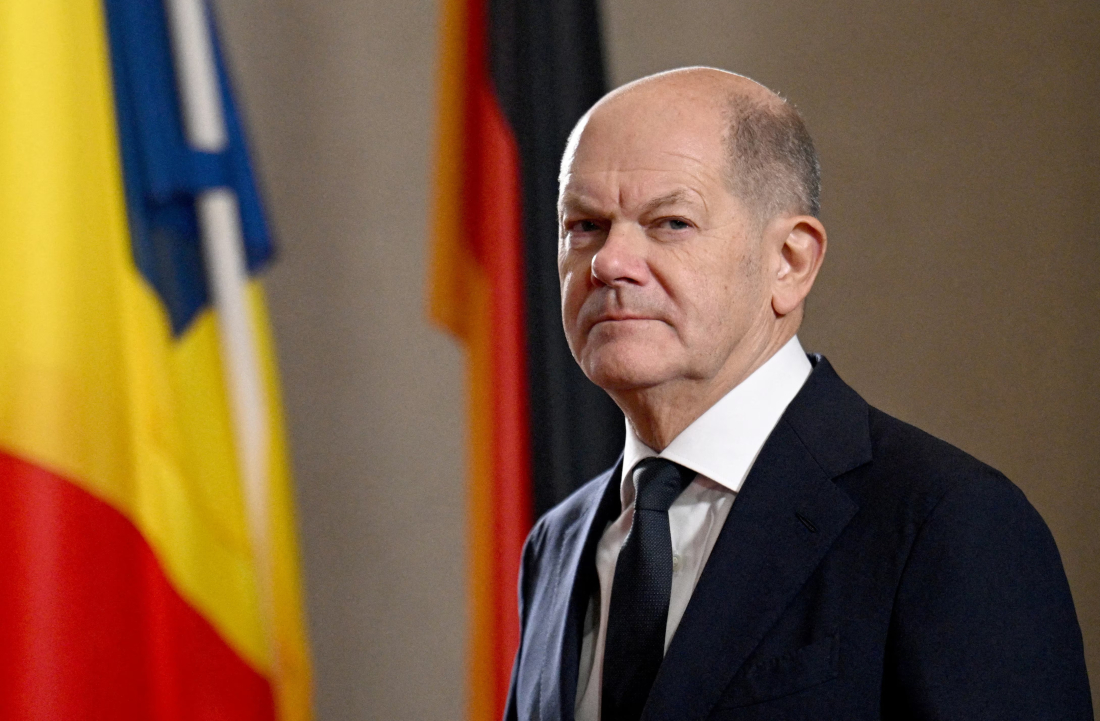
Friedrich Merz (CDU)
Merz, 69, leads the CDU and has promised to crack down on illegal migration, enforce "zero tolerance" on crime, and reverse marijuana legalization. Although his party leads in the polls, he recently faced backlash for working with the AfD to pass a non-binding motion on border controls.
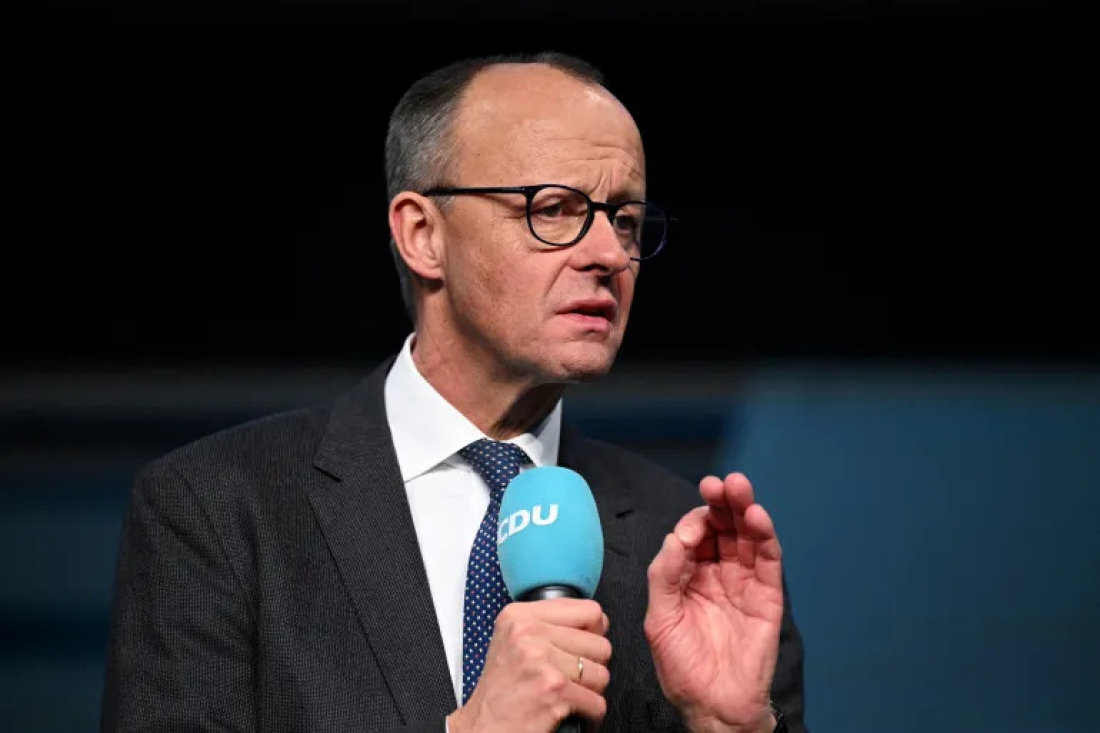
How does the German electoral system work?
Germany holds general elections every four years, but this one was moved up due to the government’s collapse. Voters cast two ballots: one for a local MP and another for a party. The second vote determines party representation in the Bundestag, Germany’s federal parliament, which has 630 seats.
A coalition government is likely, as no single party has won an absolute majority since 1961.
What time do polling stations open?
Polling stations will be open from 8:00 AM (07:00 GMT) to 6:00 PM (17:00 GMT) on Sunday. Exit poll results will be available shortly after closing, with final results expected overnight.
Germany Election: what types of coalition government are possible?
No party is expected to win an outright majority, making coalition formation inevitable. Analysts outline several possible configurations:
Grand coalition (Conservatives and Social democrats)
Germany’s next chancellor is widely expected to be Friedrich Merz of the CDU/CSU, which is currently leading in the polls. However, Merz will almost certainly need a partner to secure a parliamentary majority. A grand coalition between the CDU/CSU and Chancellor Olaf Scholz’s centre-left Social Democrats (SPD) is seen as the most likely outcome. These two parties have governed together on four occasions since World War II – three times under former Chancellor Angela Merkel. Yet Merz has shifted the CDU/CSU further to the right by advocating broad tax cuts while the SPD pushes for higher taxes on high earners and a revival of the wealth tax. Aside from the potential reform of the debt brake, these policy differences could prove difficult to reconcile.
Probability: 60% according to the Eurasia Group
Kiwi coalition (Conservatives and Greens)
A “Kiwi” coalition between the CDU/CSU and the Greens – named for their respective black and green colours – is another possibility, though considered less likely. While the parties share certain foreign policy priorities such as stronger support for Ukraine, their domestic policies, especially on migration, diverge sharply. The rift widened recently when Merz backed a motion for a crackdown on irregular migration with support from the far-right AfD, drawing the ire of the Greens. Furthermore, CSU leader Markus Söder has consistently ruled out partnering with the Greens at the national level.
Probability: 15% according to the Eurasia Group
Kenya coalition (Conservatives, social Democrats, greens)
Should smaller parties like the FDP or Die Linke barely clear the 5% threshold, Merz might be forced to seek a three-party solution. In a “Kenya” coalition – named for the resemblance of the CDU/CSU (black), SPD (red), and Greens (green) to the Kenyan flag – these three parties would come together. Such coalitions have been rare at the state level and remain untested nationally.
Probability: 10% according to the Eurasia Group
Germany coalition (Conservatives, Social democrats, Free democrats)
Another theoretical option is a three-party “Germany” coalition, combining the CDU/CSU, SPD, and FDP – echoing the national colours of black, red, and gold. However, historical tensions, notably a budget row between Scholz and FDP head Christian Lindner that previously triggered snap elections, make this configuration seem unlikely.
Probability: 10% according to the Eurasia Group
Minority government
Some German states have operated with minority governments that negotiate legislative support on a case-by-case basis. Although this approach is unprecedented at the start of a new federal term, a few politicians are now suggesting that parties should consider it given the growing complexity of forming a coherent coalition. Merz noted in a 2017 interview that minority governments should not be ruled out—though there has been little recent discussion on the subject.
What about the AfD?
One complicating factor in coalition negotiations is the far-right Alternative for Germany (AfD), which recent polls place in second position. All mainstream parties have vowed never to form a coalition with the AfD, whose controversial positions—such as advocating ‘remigration’ (mass deportations), abolishing the euro, and reintroducing military conscription—remain a major sticking point.
Alliance and Policy Compromises
As potential coalitions are discussed, a parallel debate has emerged over the legitimacy and political cost of engaging with extremist-adjacent groups. Leaders like Merz face accusations of softening their positions on contentious issues—particularly migration—in an effort to court voters disillusioned with traditional parties. Critics warn that even implicit reliance on far-right support could erode democratic norms.
Mass protests against Far-Right extremism
Amid these coalition debates, thousands of Germans have taken to the streets to protest the influence of far-right extremism. In Munich, a massive demonstration at Theresienwiese—home to the Oktoberfest—attracted a crowd estimated at over 200,000, with some organizers even suggesting numbers as high as 320,000. Protesters carried signs proclaiming “Racism and hatred is not an alternative,” and voices like pensioner Veronika Frank declared, "We are demonstrating against the right. Never again is now. I find it horrible that right-wing ideas are acceptable again, that this is being said openly." The demonstration, supported by activist groups, the Munich Film Festival, churches, and local football clubs such as FC Bayern and TSV 1860, was reported as peaceful by the police.
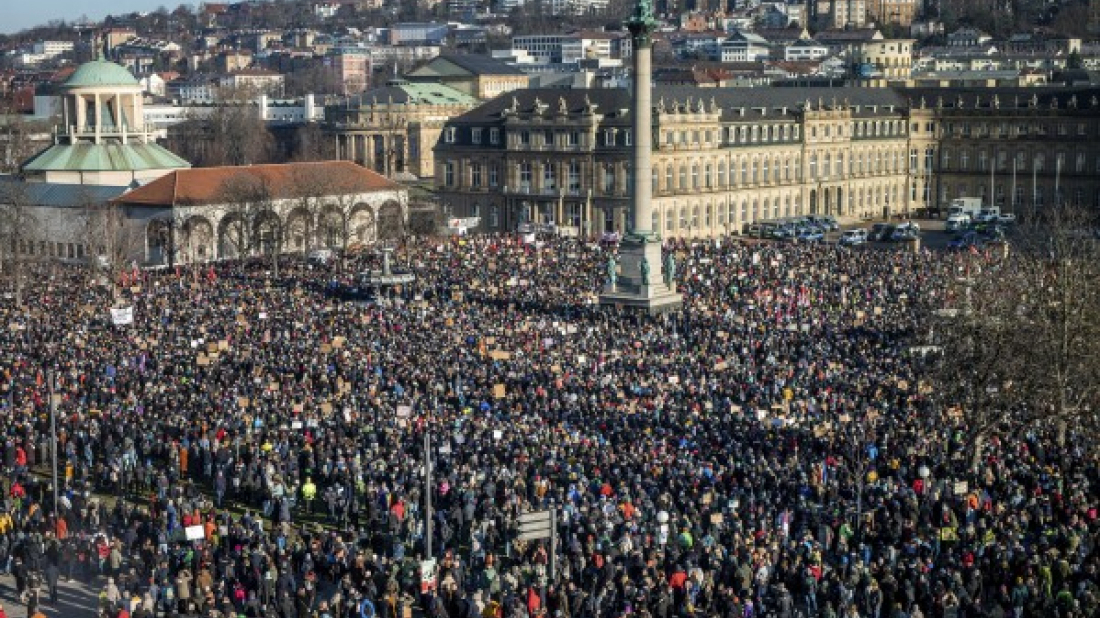
Similar protests have taken place in cities like Hanover, Rostock, and at Berlin’s Brandenburg Gate, where massive crowds blew whistles, sang anti-fascist songs, and denounced the AfD. Protesters also targeted proposals by Friedrich Merz and his party, accusing them of breaking Germany’s post-Nazi unwritten promise by seeking the support of far-right groups.
Elon Musk’s political interference
Tech billionaire Elon Musk has further stirred controversy by virtually joining an AfD rally and publicly endorsing the party as “the best hope for Germany.” His active involvement—from social media posts to op-ed pieces—has been met with widespread criticism from mainstream politicians and civil society groups, who argue that such endorsements lend undue credibility to extremist views and risk undermining the integrity of Germany’s domestic political process .
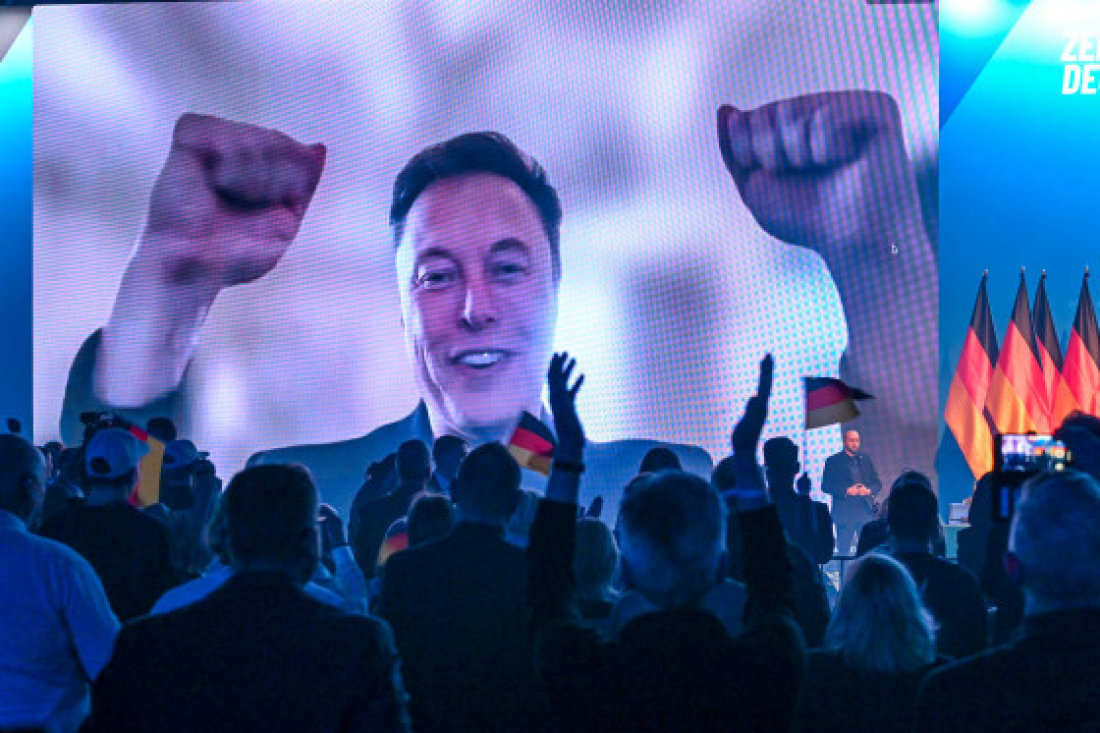
Germany has been the second-largest supplier of military aid to Ukraine after the U.S., providing €7.1 billion ($7.4bn) in 2024. While the SPD, CDU, and Greens support continued assistance, Scholz has emphasized diplomacy. In contrast, the AfD and BSW oppose further military aid and advocate for restoring ties with Moscow.
Economy
Germany’s debt brake law restricts public spending, allowing borrowing up to 0.35% of GDP in emergencies. Scholz and the Greens support reforming it, while the CDU remains cautious. The AfD and FDP oppose any changes and advocate for reintroducing the Deutschmark and possibly exiting the EU.
Migration
All major parties except the Greens have proposed stricter migration policies following recent violent incidents. The CDU and SPD back tougher border controls and deportations, while the AfD calls for closing borders entirely. The Greens advocate for an open-door asylum policy.
Professor Borbath noted that migration debates have increasingly shifted rightward, with even center-left parties adopting stricter stances.
Photo 4: (GERMANY ELECTIONS 2025 – Bundestag seat distribution: The Bundestag had 733 seats in 2021, but a 2023 reform capped it at 630 for future elections.)
As the election approaches, voters face critical choices that will shape Germany’s domestic policies and international stance for years to come.
Follow the latest developments and global reaction after the U.S. and Israel launched “major combat operations” in Iran, prompting retaliation from Tehran.
Governments across the region responded swiftly to Israel’s strikes on Iran, closing airspace, issuing travel advisories and activating contingency plans amid fears of escalation.
Ayatollah Alireza Arafi has moved into a pivotal constitutional role following the death of Supreme Leader Ayatollah Ali Khamenei, becoming the clerical member of Iran’s temporary leadership council under Article 111 of the Constitution of the Islamic Republic of Iran.
A senior Iranian official has warned Israel to “prepare for what is coming”, insisting that Tehran’s response to the latest escalation in the Middle East will be made openly and without limits.
Ayatollah Ali Khamenei, Iran’s supreme leader for 36 years and the country’s highest political and religious authority, has died aged 86 following joint Israeli and U.S. strikes on his compound in Tehran.
Protests broke out in Pakistan and Iraq on Sunday after Iranian state media confirmed that Supreme Leader Ayatollah Ali Khamenei had been killed in joint U.S.–Israeli strikes. At least nine people were reported dead in clashes near the U.S. consulate in Karachi.
Afghanistan said it had fired at Pakistani aircraft over Kabul after explosions and gunfire rocked the capital early on Sunday, marking a sharp escalation in fighting between the two neighbours.
A senior Iranian official has warned Israel to “prepare for what is coming”, insisting that Tehran’s response to the latest escalation in the Middle East will be made openly and without limits.
Cuba has released extensive details of a deadly midweek shootout at sea, showing rifles, pistols and nearly 13,000 rounds of ammunition that it says were carried by a group of exiles who attempted to enter the island by speedboat.
Afghanistan’s Taliban rulers said on Friday (27 February) they were ready to negotiate after Pakistan bombed their forces in several Afghan cities, including Kabul and Kandahar, and Islamabad declared the neighbours were now in "open war".
You can download the AnewZ application from Play Store and the App Store.

What is your opinion on this topic?
Leave the first comment